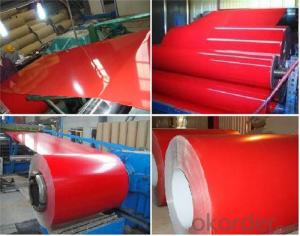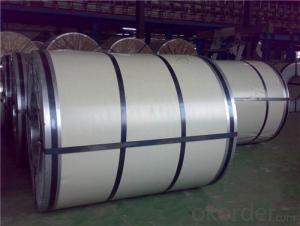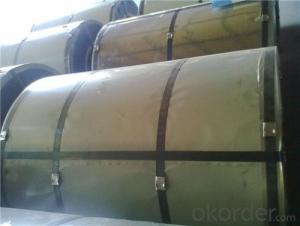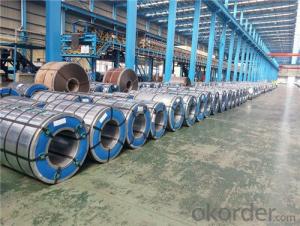Prepainted rolled Steel Coil for construction Roofing Constrution
- Loading Port:
- Shanghai
- Payment Terms:
- TT OR LC
- Min Order Qty:
- 50 m.t.
- Supply Capability:
- 30000 m.t./month
OKorder Service Pledge
OKorder Financial Service
You Might Also Like
Structure of Prepainted Rolled steel Coil for Construction Roofing
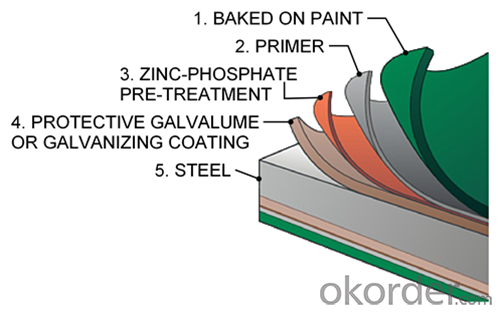
Description of Prepainted Rolled steel Coil for Construction Roofing
Prepainted Rolled steel Coil is a kind of coated steel coil/sheet. With the cold rolled steel of different strength and thickness as substrate, it is produced through applying Al-Zn coat on both faces by hot dip process. In its coating, Al accounts for about 55%, Si 1.6%, while the remaining is Zn. Aluminum zinc coils enjoys both the physical protective feature and durability of Al and the electrochemical protective property of Zn. And its surface has bright silver color and regular embossed-like figure, which are highly decorative.
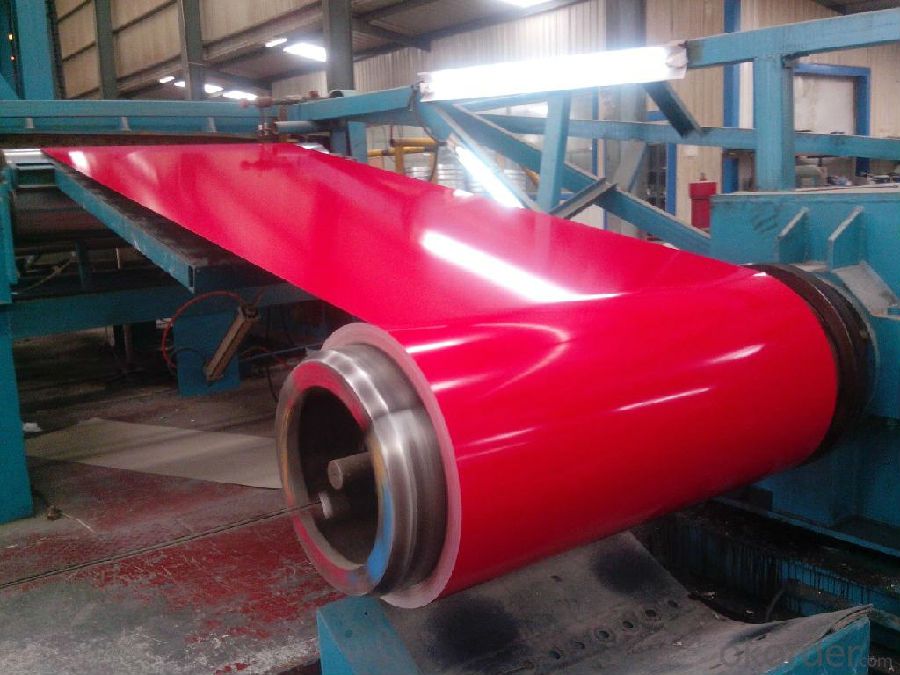
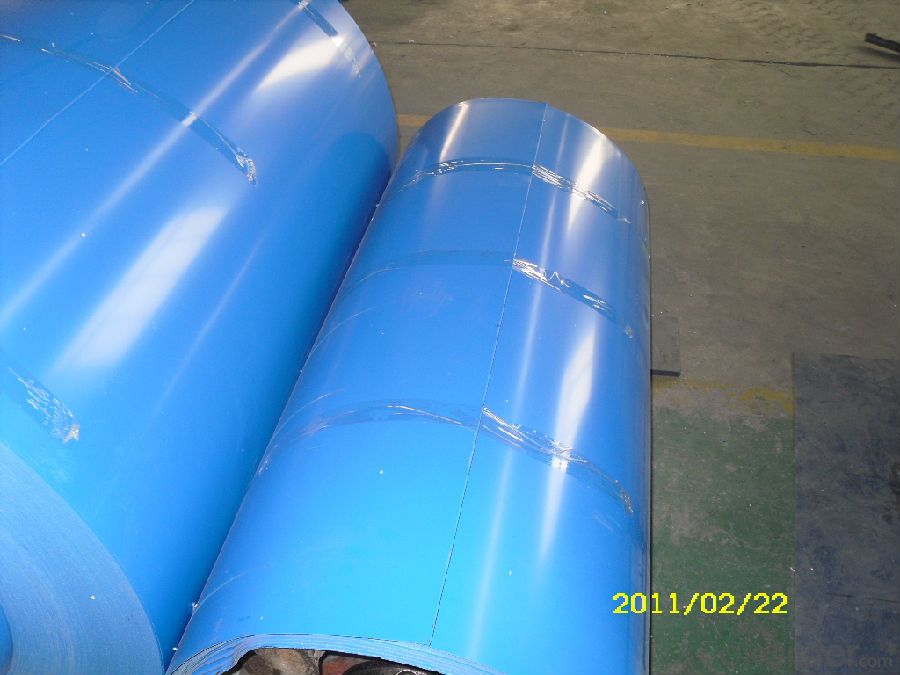
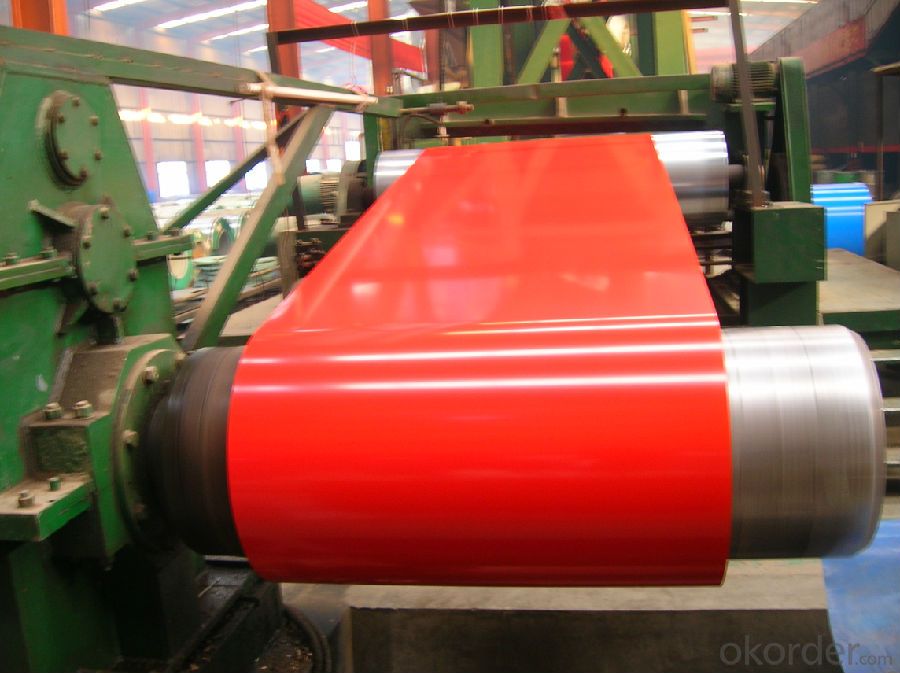
Main Feature of Prepainted Rolled steel Coil for Construction Roofing
1.Corrosion resistance: It mainly depends on the aluminum protection. When the zinc being worn, the aluminum will form a dense layer of aluminum oxide, resist corrosion material to prevent further corrosion inside.
2. Heat resistance: Aluminum zinc alloy steel sheet has excellent heat resistance, can withstand high temperatures over 300 centigrade, and is similar with aluminized steel high temperature oxidation resistance. It often used in chimney pipes, ovens, fluorescent lighting device and the device cover.
3. Heat reflective: Galvanized steel plate heat-reflective high rate is twice as galvanized steel, often used to make insulation materials.
4. Economy: Because density of 55% AL-Zn is smaller than the density of Zn, so in the same weight and thickness of Galvanized zinc layer, aluminum-zinc steel plate is larger area more than 3% of galvanized steel sheet.
Applications of Prepainted Rolled steel Coil for Construction Roofing
1. Construction and building: roofing; ventilating duct; handrail; partition panel;etc.
2. Electric appliance: refrigerator; washing machine; refrigerator; DVD;etc.
3.Transportation: oil tank; road sign; etc.
4.Agriculture:barn; etc.
5.Others:vending machine; game machine; etc.
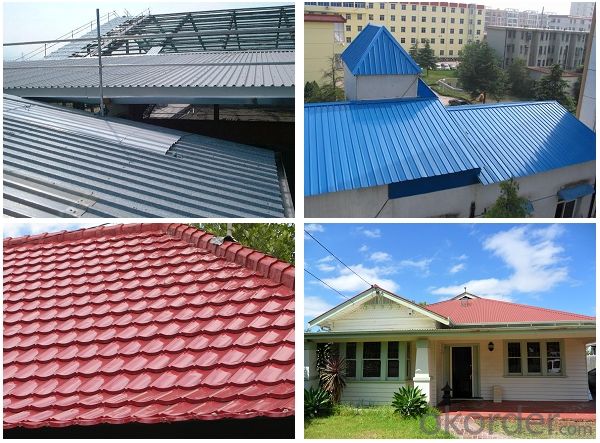
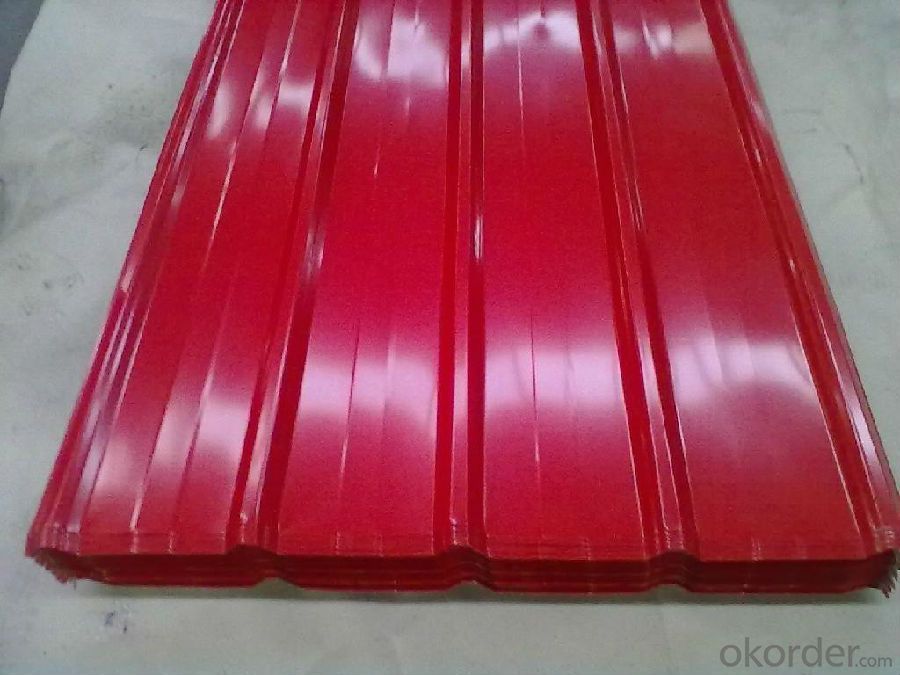
Specifications of Rolled steel Coil for Construction Roofing
Product | Prepainted Rolled steel Coil for Construction Roofing |
Material Grade | SGCC / SGCH / DX51D+AZ, etc |
Thickness | 0.2-3.0mm |
Width | 600-1500mm |
Tolerance | Thickness: +/-0.02mm , Width:+/-2mm |
Zinc-coating | AZ40-150g/m2 |
Technique | Raw material: Hot rolled steel coil --> Cold rolled_>hot dipped galvalume |
Surface | Dried, Chromated, Unoiled |
Spangle | Regular spangle , small spangle, zero spangle |
ID | 508MM |
Coil weight | 10MT max |
Export package | Cardboard inner sleeves, Waterproof paper, galvanized steel covered and steel strip packed |
FAQ of Prepainted Rolled steel Coil for Construction Roofing
We have organized several common questions for our clients,may help you sincerely:
1. What is the minimum order quantity ?
Our MOQ is 50mt for each size. And we will consider to give more discount if you make big order like 1000 tons and more. Further more, the more appropriate payment term your offer the better price we can provide.
2. How long can we receive the product after purchase?
Usually within thirty working days after receiving buyer’s advance payment or LC. We will arrange the factory manufacturing as soon as possible. The cargo readiness usually takes 15-25 days, but the shipment will depend on the vessel situation.
3. How to guarantee the quality of the products?
We have established the international advanced quality management system,every link from raw material to final product we have strict quality test;We resolutely put an end to unqualified products flowing into the market. At the same time, we will provide necessary follow-up service assurance.
- Q:How are steel coils inspected for surface defects using non-destructive testing methods?
- To ensure the quality and integrity of steel coils, non-destructive testing (NDT) methods are employed to inspect them for surface defects. Several common NDT methods are utilized in this process. Visual inspection is one of the most widely used methods, where trained inspectors visually examine the steel coils for visible defects like scratches, cracks, pits, or corrosion. Although this method is simple and cost-effective, it can only detect surface-level defects. Magnetic particle testing (MT) is another commonly used NDT method. It utilizes magnetism to identify surface and near-surface defects in ferromagnetic materials like steel. By applying a magnetic field and iron particles to the steel coil, any defects such as cracks or discontinuities become visible as the iron particles concentrate around them. Liquid penetrant testing (PT) is a different NDT method used for inspecting steel coils. It involves applying a liquid penetrant to the coil's surface, which is drawn into surface defects through capillary action. After removing excess penetrant and applying a developer, the defects become visible as the developer draws out the penetrant. Ultrasonic testing (UT) is widely used to detect both surface and subsurface defects in steel coils. It transmits high-frequency sound waves into the coil and analyzes the reflected waves to identify abnormalities. This method can detect defects like cracks, inclusions, and voids that may not be visible to the naked eye. Additionally, eddy current testing (ECT) is another NDT method for inspecting steel coils. It utilizes electromagnetic induction to detect surface and near-surface defects. By placing a coil carrying an alternating current near the surface of the coil being inspected, any changes in the coil's electrical conductivity caused by surface defects are detected and analyzed to identify and evaluate their severity. In summary, various non-destructive testing methods such as visual inspection, magnetic particle testing, liquid penetrant testing, ultrasonic testing, and eddy current testing are utilized to inspect steel coils for surface defects. These methods ensure the quality and integrity of the steel coils before they are used in various applications.
- Q:Which of the two are better for exhaust manifolds, im guessing the stainless steel right?
- stainless
- Q:What are the benefits of using steel coils in the manufacturing of pipes?
- There are several benefits of using steel coils in the manufacturing of pipes: 1. Strength and durability: Steel is known for its strength and durability, making it an ideal material for pipes. Steel coils provide a strong foundation for pipes, ensuring they can withstand high-pressure applications and resist damage from external factors such as impact or corrosion. This strength and durability enhance the longevity of the pipes, reducing the need for frequent replacements. 2. Flexibility: Steel coils offer flexibility in terms of customization and design. They can be easily formed into various pipe shapes and sizes, allowing manufacturers to produce pipes that meet specific project requirements. This flexibility also enables the production of seamless pipes, which have superior structural integrity and reduced risk of leakage. 3. Thermal resistance: Steel has excellent thermal conductivity, meaning it can efficiently transfer heat or cold. This property is crucial for pipes used in industries such as oil and gas, where temperature control is essential. Steel coils enable the manufacturing of pipes that can effectively handle extreme temperatures, preventing any damage to the pipes or the substances flowing through them. 4. Cost-effectiveness: Steel coils can be produced in large quantities, resulting in economies of scale and lower production costs. This cost-effectiveness is beneficial for both manufacturers and consumers, as it helps keep the overall cost of pipes down. Additionally, the durability of steel pipes reduces the need for frequent repairs or replacements, saving money in the long run. 5. Corrosion resistance: Steel coils can be coated with protective layers to enhance their resistance to corrosion. This corrosion resistance is crucial in applications where pipes come into contact with corrosive substances or are exposed to harsh environmental conditions. By using steel coils with appropriate coatings, manufacturers can ensure that their pipes have a longer lifespan and maintain their structural integrity under challenging circumstances. Overall, the use of steel coils in pipe manufacturing offers numerous advantages, including strength, flexibility, thermal resistance, cost-effectiveness, and corrosion resistance. These benefits make steel coils a preferred choice for many industries that rely on durable and efficient piping systems.
- Q:How many millimeters is a number 3 steel crochet hook?
- A okorder /. . If your hooks are marked by letters and milimeters, they are likely intended for working with YARN, not crochet thread. The steel hooks are smaller and are used with thread rather than with yarn. In addition, if you're working with a vintage pattern, a hook may be called for that you cannot purchase today. Here is a web site that explains many of the puzzling questions about hooks
- Q:How do steel coils impact the overall cost of production?
- The overall cost of production in various industries is greatly affected by steel coils. Initially, the expense of the steel coils themselves can be quite significant. The price of steel is influenced by several factors, including supply and demand, raw material costs, and market fluctuations. Any increase in the price of steel coils can directly impact the overall cost of production, as they are a major component in the manufacturing process. Furthermore, the operational costs of production are also influenced by steel coils. These coils are commonly used in different manufacturing processes, such as stamping, rolling, and forming, which require specialized machinery. The efficiency and effectiveness of these processes greatly depend on the durability, quality, and size of the steel coils. If the coils are of low quality or not suitable for the specific production requirements, it can result in increased downtime, machinery maintenance, and rework, all contributing to higher production costs. Additionally, the transportation costs associated with steel coils can impact the overall cost of production. Steel coils are typically heavy and bulky, requiring special handling and transportation arrangements. The logistics costs can be significantly influenced by factors such as the distance between the supplier and the production facility, as well as the chosen mode of transportation. Any rise in transportation expenses, such as fuel prices or shipping fees, can directly affect the overall cost of production. Lastly, the availability of steel coils can also impact production costs. During periods of high demand or limited supply, the price of steel coils may increase, resulting in higher production costs. Moreover, if there is a shortage of steel coils due to trade restrictions or disruptions in the supply chain, manufacturers may have to resort to alternative materials or sources, which could be more expensive or of lower quality. These factors can have a ripple effect on the overall cost of production. In conclusion, steel coils have a significant impact on the overall cost of production. Their cost, quality, transportation, and availability all influence the efficiency, effectiveness, and affordability of the manufacturing process. Therefore, manufacturers must carefully consider and manage these factors to optimize their production costs and maintain competitiveness in their respective industries.
- Q:What are the dimensions of steel coils used in the automotive industry?
- The dimensions of steel coils used in the automotive industry can vary depending on the specific application and requirements. However, typical dimensions for steel coils used in the automotive industry range from 0.5mm to 3mm in thickness and from 500mm to 2000mm in width. The length of the coils can vary depending on the production process and customer specifications. Additionally, the weight of the coils can range from a few hundred kilograms to several tons. It is important to note that these dimensions are general guidelines and can vary depending on the specific needs of the automotive manufacturer.
- Q:- I'm considering doing my physics coursework on the uses of Mild Steel in skyscrapers and construction, would this be right? Some sources tell me mild steel is too weak, others say it is fine
- Mild steel doesn't really mean anything, technically. In today's world all steel is mild steel unless it's high carbon or alloy, which are mostly tool steels. You'll need to study steel much deeper than that to accomplish any real physics work relating to steel.
- Q:I am currently writing a manuscript, and would like to know whether guns made out of steel, burn or melt when exposed to flames. Thanks.
- Any steel will burn in the Presence of pure oxygen and high heat, that's how a cutting torch works.
- Q:i need a company that sells strong steel doors because my neighbors apartment was broken into. I need a strong steel door for the outside of the home, where you first enter. please list places in the US, or in NY.
- You can find strong steel door here...
- Q:does regular steel rust? or is it all the same.
- Rusting is what steel, or any iron alloy, does best. Stainless steels rely on a small amount of either nickel or chromium, or occasionally some other element, to protect it. What these do is they actually oxidize faster than the iron does but this oxidation forms a microscopically thin, effectively invisible, but very tough coating of oxide that then protects the rest of the metal.
1. Manufacturer Overview |
|
|---|---|
| Location | |
| Year Established | |
| Annual Output Value | |
| Main Markets | |
| Company Certifications | |
2. Manufacturer Certificates |
|
|---|---|
| a) Certification Name | |
| Range | |
| Reference | |
| Validity Period | |
3. Manufacturer Capability |
|
|---|---|
| a)Trade Capacity | |
| Nearest Port | |
| Export Percentage | |
| No.of Employees in Trade Department | |
| Language Spoken: | |
| b)Factory Information | |
| Factory Size: | |
| No. of Production Lines | |
| Contract Manufacturing | |
| Product Price Range | |
Send your message to us
Prepainted rolled Steel Coil for construction Roofing Constrution
- Loading Port:
- Shanghai
- Payment Terms:
- TT OR LC
- Min Order Qty:
- 50 m.t.
- Supply Capability:
- 30000 m.t./month
OKorder Service Pledge
OKorder Financial Service
Similar products
New products
Hot products
Related keywords
